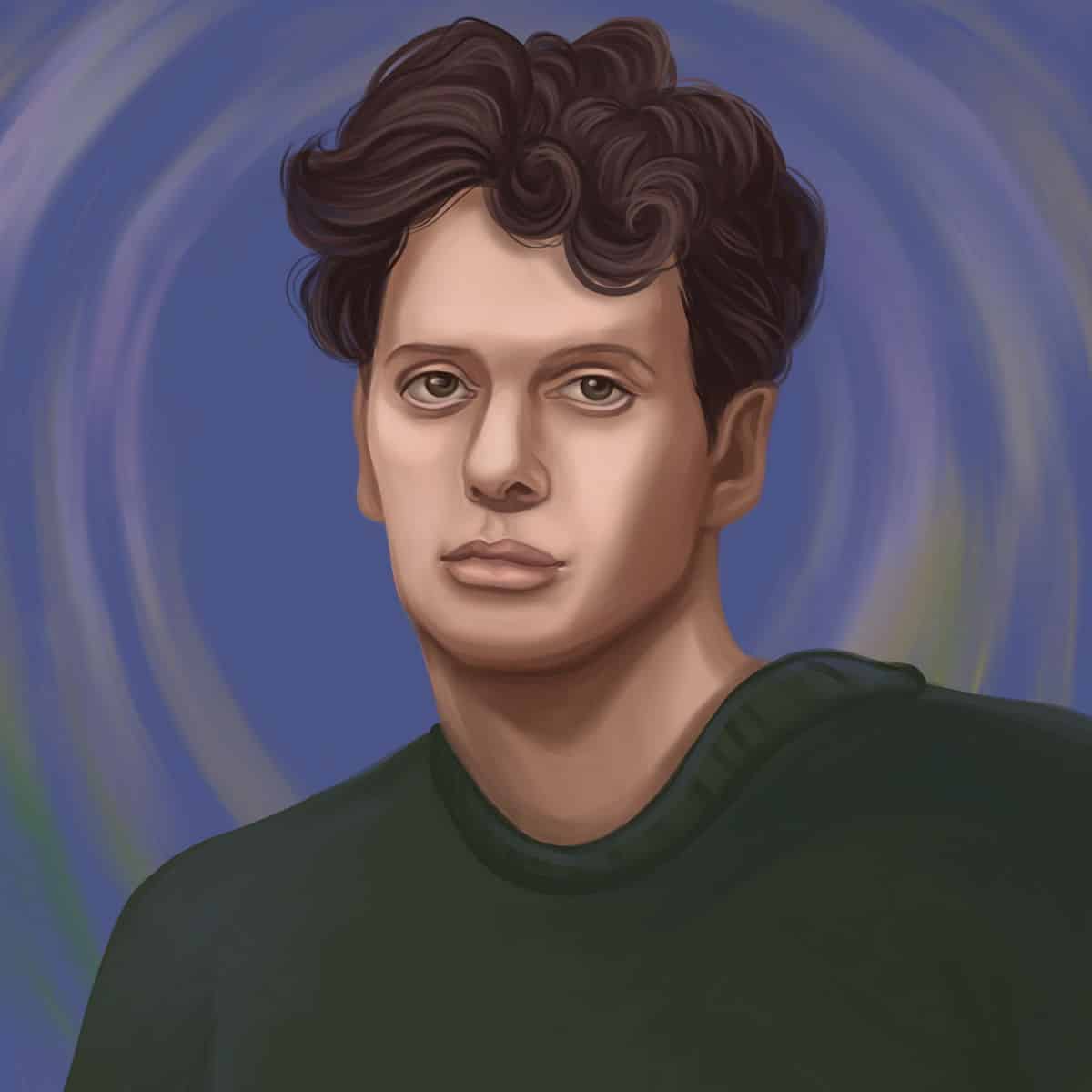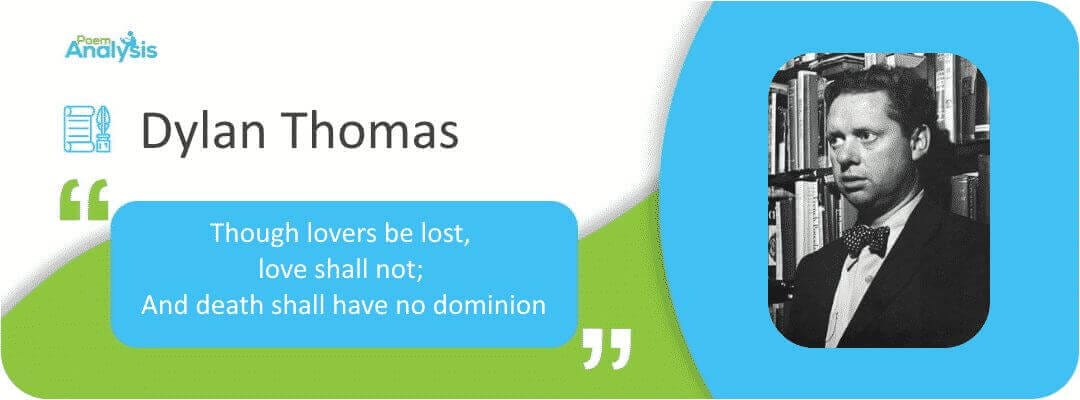Dylan Thomas was born in October of 1914 in Swansea, Wales. He is best remembered for his poetry but he also wrote short stories and worked for BBC as a scriptwriter. Some of his most famous poems are ‘Fern Hill‘ and ‘Do Not Go Gentle Into That Good Night‘. He is one of the most celebrated writers of the 20th century.
Life Facts
- Dylan Thomas was born in October of 1914 in Swansea, Wales.
- Thomas’s most famous poems were published while he was still quite young.
- He won the 1934 Poet’s Corner Prize.
- He married Caitlin Macnamara in 1937.
- Thomas died on November 9, 1953 at thirty-nine years old.
Interesting Facts
- Dylan Thomas left school to become a reporter for the South Wales Daily Post.
- His short story collections sold poorly in the late 30s and he was forced to leave Laugharne in 1940 to escape creditors.
- He worked at Strand Films and for the BBC as a scriptwriter.
- He and his family were homeless for a period of time.
- Thomas was a heavy drinker and had a number of extramarital affairs.
Famous Poems
- ‘Fern Hill’ is often considered to be his most famous poem. The title comes from the name of the house in which Thomas’s aunt, Ann, lived. In this piece, he is looking back on his childhood and trying to understand the meaning of youth and innocence. The poem is filled with pastoral images.
- ‘Light Breaks Where No Sun Shines’ was published in The Listener in 1934. The poem is made up of a string of related and often seemingly unrelated imagery. The pervading image of the light breaking through reveals the intimacy of private moments and the less discussed, yet beautiful moments of life.
- ‘And Death Shall Have No Dominion’ was first published in May of 1933 in New England Weekly. It takes its title from Romans and refers to the resurrection of Christ. In the poem, the poet looks at the various ways that death control humankind. While it’s powerful, it doesn’t control everything.
- ‘Do Not Go Gentle Into That Good Night’ is one of his best-loved poems. It was first published in 1951 and is directed at his father who had recently passed away. This event is used to address a universal desire to fight back against the coming of the darkness of night that is death. Through powerful and skillfully composed language the poet encourages the reader to “not” go gently into one’s death.
- ‘A Refusal to Mourn the Death, by Fire, of a Child in London’ is based around WWII and describes the poet’s inability to comprehend the number of types f deaths that filled London and the wider countryside at that time. He speaks directly about the death of a child and how he refuses to mourn the death. He won’t truly feel for her until it is time for him to face his own death.
Explore 10 of the best Dylan Thomas poems.
Early Life
His mother, Florence Hannah, was a seamstress and his father, David John Thomas, was a teacher. Thomas had one sibling, Nancy, who was eight years older than he was. Due to the fact that Thomas’ father was a teacher, and had received a first-class honors degree from University College, Aberystwyth, the children were made to learn both Welsh and English. The Thomas children were raised in a respectable area of town and would often travel out to the countryside to visit with extended family. Scenes from the country would appear throughout Thomas’ later poetry.
Thomas was first sent to a private school called, Mrs. Hole’s dame school. It was very near to his home and Thomas considered the experience to have been a pleasant one. He was later enrolled at Swansea Grammar School for boys in Mount Pleasant. It was here that his father taught English. His teachers did not consider him to a pupil of much merit, although one of his poems was published in the school’s magazine during his first year as a student.
In 1931, Thomas left school to become a reporter for the South Wales Daily Post. He only worked here for a short time before leaving 18 months later. He would work as a freelance journalist over the following years and start to amass a large collection of poems. They would eventually number in the 200s. Over half the poems he would go on to publish throughout his career was written during this time.
Literary Career
Thomas’ most famous poems were published while he was still quite young. These included, ‘And death shall have no dominion’ as well as ‘The Force That Through the Green Fuse Drives the Flower’ and ‘Before I Knocked.’ Another work, ‘Light breaks where no sun shines,’ was published in The Listener in 1934. It brought Thomas to the attention of some of the greatest literary figures of the day, one of which was T.S. Eliot. Thomas was contacted by a publisher and his first collection, 18 Poems, was published in 1934. It was subject to great critical acclaim. He won the 1934 Poet’s Corner Prize.
Two years later, in 1936, Twenty Five Poems was published. It was during this same time period that Thomas met dancer Caitlin Macnamara. They were married in 1937 and moved to Wales a year later. They lived in Laugharne, Carmarthenshire when their first child, Llewelyn Edouard was born in 1939. This was the same year that Thomas’s third collection, The Map of Love, was published.
His next book was a collection of short stories titled, Portrait of the Artist as a Young Dog. These tales were based on real-life romances set in Wales. This collection, as well as The Map of Love, which featured more fantastical stories, sold poorly. Thomas was borrowing money from his friends and family but was forced to leave Laugharne in July of 1940 to escape creditors.
Film, Broadcasting, and Literary Career
In 1941, Thomas and his wife moved to London where he hoped to find more work. He eventually found employment with Strand Films. These years also saw Thomas embark on a number of extramarital affairs, such as that with Pamela Glendower. In 1943, Glendower gave birth to a daughter, Aeronwy.
Thomas had taken a break from writing poetry but resumed after fleeing London to live in a cottage in Llangain. Here he wrote the poems ‘Holy Spring’ and ‘Vision and Prayer.’ Although Thomas had found some success as a poet, his work was not bringing in money. He eventually had to go to work for the BBC as a film scriptwriter. Although he was able to pursue this work during the years of World War II, he still did not have enough money to support his family.
In 1946 Thomas published Death and Entrances. This work is often considered to be the one that truly solidified his career. It was also during this time period that Thomas began broadcasting with the BBC. He became a familiar and well-loved radio personality. Despite the successes, Thomas was turning more and more to alcohol and the family still did not have enough money to live.
Later Life and Death
They moved to their final home, after a brief stint of homelessness, in April of 1949. It was here that Caitlin gave birth to their third child, Colm. In the early 50s, Thomas was invited on a tour of New York. He spent time on campuses, lecturing in front of large audiences, and drinking heavily at the various parties he was invited to. Thomas briefly returned to London, then traveled to Iran, intent on creating a film about the Anglo-Iranian Oil Company. This work never came to fruition.
In 1952 he went once more to America. This time Caitlin accompanied him and they drank together. Thomas was suffering from gout as well as increased problems with his lungs. The third tour of America began the following year, but in October he began to feel increasingly unwell. His condition deteriorated over the next month and Thomas died on November 9, 1953, at thirty-nine years old.
Influence from other Poets
Dylan Thomas was notably influenced by writers such as T.S. Eliot, William Butler Yeats, James Joyce, John Donne, and Arthur Rimbaud.



